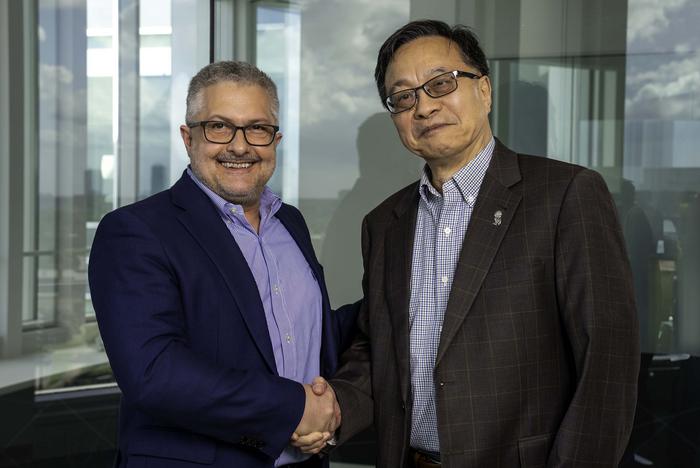HOUSTON ― The University of Texas MD Anderson Cancer Center and Rice University today announced the creation of the Cancer Bioengineering Collaborative to develop innovative technologies and bioengineering approaches to improve cancer research, diagnosis and treatment.

Credit: Rice University
HOUSTON ― The University of Texas MD Anderson Cancer Center and Rice University today announced the creation of the Cancer Bioengineering Collaborative to develop innovative technologies and bioengineering approaches to improve cancer research, diagnosis and treatment.
Led by Rice’s Gang Bao, Ph.D., and MD Anderson’s Jeffrey Molldrem, M.D., the initiative aims to foster collaboration between the two institutions on fundamental and translational cancer research, to develop new technologies for cancer detection and therapy, and to secure external funding in support of further research and training.
Envisioned as a hub for accelerating the journey from laboratory research to clinical application, the Cancer Bioengineering Collaborative leverages the two institutions’ complementary strengths to drive discovery and innovation in five key research areas:
- Cell therapies: Developing more effective cell-based immunotherapies, including chimeric antigen receptor- and T cell receptor-based approaches
- Nanotechnologies: Using nanoparticles for targeted cancer detection and therapy
- Cancer vaccines: Incorporating advanced biomaterials, synthetic biology and nanoparticle delivery systems to develop therapeutic cancer vaccines
- Artificial intelligence: Leveraging advanced computing tools for high-precision analysis of samples to identify new targets and inform therapeutic design
- Molecular imaging: Deploying advanced molecular imaging techniques to enhance diagnostic and therapeutic tools
“There is tremendous potential in bringing together experts in engineering and cancer as part of this focused, collaborative framework that is truly unique, not only owing to the complementary nature of the respective strengths but also because this is the first formal joint research initiative of its kind between the two institutions,” said Bao, department chair and Foyt Family Professor of Bioengineering, professor of chemistry, materials science and nanoengineering and mechanical engineering, and Cancer Prevention and Research Institute of Texas (CPRIT) scholar.
In support of its goals, the collaborative will launch new joint efforts, including a seed grant program to facilitate collaboration between investigators at Rice and MD Anderson; a monthly seminar series focused on cancer bioengineering; annual retreats to showcase cutting-edge research and further stimulate new collaborations; and hosting international leaders in cancer and bioengineering research.
“From fundamental discoveries in cancer science, tumor immunology and patient care to innovative engineering advances in drug delivery systems, nanostructures and synthetic biology, there is great potential for enabling cross-disciplinary collaboration to develop new technologies and approaches for detecting, monitoring and treating cancer,” said Molldrem, chair of Hematopoietic Biology & Malignancy at MD Anderson. “Our goal is to bridge the gap between bioengineering and cancer research to create transformative solutions that significantly improve patient outcomes.”
Rice is home to a top-ranking bioengineering department whose faculty stand at the forefront of research in biomaterials, nanotechnology, genome engineering, synthetic biology, neuro-engineering and computational modeling. MD Anderson ranks as one of the world’s most respected centers focused on cancer patient care, research, education and prevention. By expanding prior and existing collaborations between the two institutions, the Cancer Bioengineering Collaborative will work to accelerate innovative solutions to address unmet medical needs in cancer prevention, detection and treatment.
Read this press release in the MD Anderson Newsroom.
-30-
About MD Anderson
The University of Texas MD Anderson Cancer Center in Houston ranks as one of the world’s most respected centers focused on cancer patient care, research, education and prevention. The institution’s sole mission is to end cancer for patients and their families around the world, and, in 1971, it became one of the nation’s first National Cancer Institute (NCI)-designated comprehensive cancer centers. MD Anderson is No. 1 for cancer in U.S. News & World Report’s “Best Hospitals” rankings and has been named one of the nation’s top two hospitals for cancer since the rankings began in 1990. MD Anderson receives a cancer center support grant from the NCI of the National Institutes of Health (P30 CA016672).
About Rice
Located on a 300-acre forested campus in Houston, Rice University is consistently ranked among the nation’s top 20 universities by U.S. News & World Report. Rice has highly respected schools of architecture, business, continuing studies, engineering, humanities, music, natural sciences and social sciences and is home to the Baker Institute for Public Policy. With 4,574 undergraduates and 3,982 graduate students, Rice’s undergraduate student-to-faculty ratio is just under 6-to-1. Its residential college system builds close-knit communities and lifelong friendships, just one reason why Rice is ranked No. 1 for lots of race/class interaction, No. 2 for best-run colleges and No. 12 for quality of life by the Princeton Review. Rice is also rated as a best value among private universities by Kiplinger’s Personal Finance.
Discover more from Science
Subscribe to get the latest posts sent to your email.


